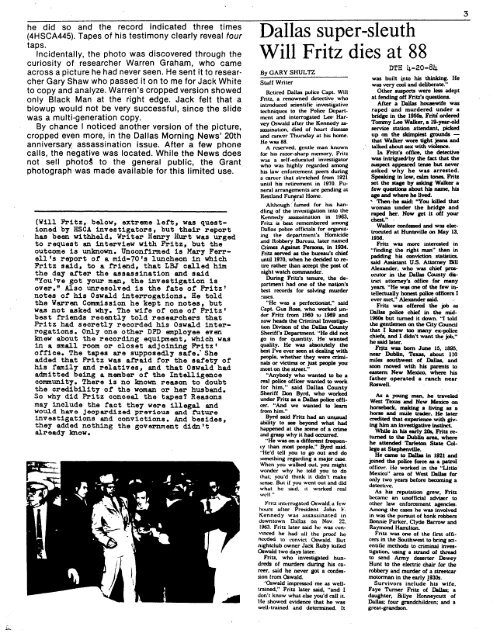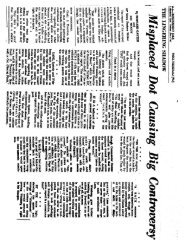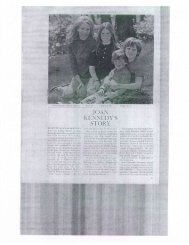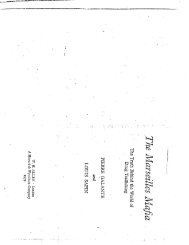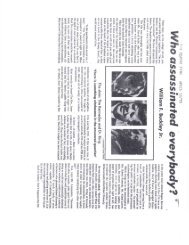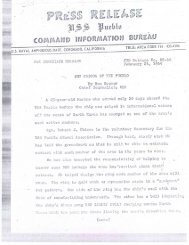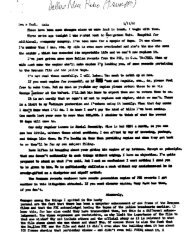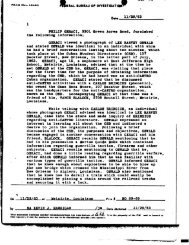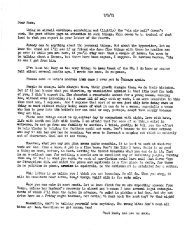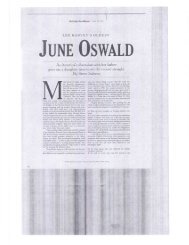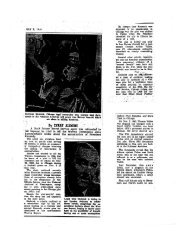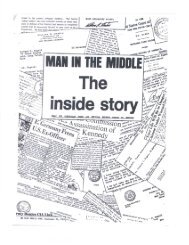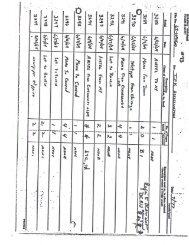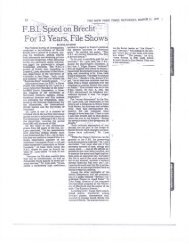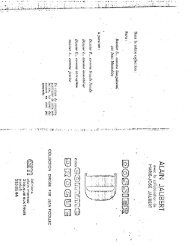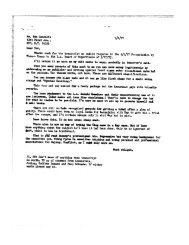coverups! - The Harold Weisberg Archive
coverups! - The Harold Weisberg Archive
coverups! - The Harold Weisberg Archive
Create successful ePaper yourself
Turn your PDF publications into a flip-book with our unique Google optimized e-Paper software.
he did so and the record indicated three times<br />
(4HSCA445). Tapes of his testimony clearly reveal four<br />
taps.<br />
Incidentally, the photo was discovered through the<br />
curiosity of researcher Warren Graham, who came<br />
across a picture he had never seen. He sent it to researcher<br />
Gary Shaw who passed it on to me for Jack White<br />
to copy and analyze. Warren's cropped version showed<br />
only Black Man at the right edge. Jack felt that a<br />
blowup would not be very successful, since the slide<br />
was a multi-generation copy.<br />
By chance I noticed another version of the picture,<br />
cropped even more, in the Dallas Morning News' 20th<br />
anniversary assassination issue. After a few phone<br />
calls, the negative was located. While the News does<br />
not sell photot to the general public, the Grant<br />
photograph was made available for this limited use.<br />
(Will Fritz,. below, extreme left, was questioned<br />
by HSCA investigators, but their report<br />
has been withheld. Writer Henry Hurt was urged<br />
to request an interview with Fritz, but the<br />
outcome is unknown. Unconfirmed is Mary Ferrell's<br />
report of a mid-70's luncheon in which<br />
Fritz said, to a friend, that LBJ called him<br />
the day after the assassination and said<br />
"You've got your man, the investigation is<br />
over." Also unresolved is the fate of Fritz'<br />
notes of his Oswald interrogations. He told<br />
the Warren Commission he kept no notes, but<br />
was not asked why. <strong>The</strong> wife of one of Fritz'<br />
best friends recently told researchers that<br />
Fritz had secretly recorded his Oswald interrogations.<br />
Only one other DPD employee even<br />
knew about the recording equipment, which was<br />
in a small room or closet adjoining Fritz'<br />
office. <strong>The</strong> tapes are supposedly safe.'She<br />
added that Fritz was afraid for the safety of<br />
his family and relatives, and that Oswald had<br />
admitted being a member of the Intelligence<br />
community. <strong>The</strong>re is no known reason to doubt<br />
the credibility of the woman or her husband.<br />
So why did Fritz conceal the tapes? Reasons<br />
may include the fact they were illegal and<br />
would have jeopardized previous and future<br />
investigations and convictions. And besides,<br />
they added nothing the government didn't<br />
already know.<br />
Dallas super-sleuth<br />
Will Fritz dies at 88<br />
By GARY SHULTZ<br />
Staff Writer<br />
Retired Dallas police Capt. Will<br />
Fritz, a renowned detective who<br />
introduced scientific investigative<br />
techniques to the Police Department<br />
and interrogated Lee- Harvey<br />
Oswald after the Kennedy assassination.<br />
died of heart disease<br />
and cancer Thursday at his home.<br />
He was 88.<br />
A reserved. gentle man known<br />
for his razor-sharp memory. Fritz<br />
was a self-educated investigator<br />
who was highly regarded among<br />
his law enforcement peers during<br />
a career that stretched from 1921<br />
until his retirement in 1970. Funeral<br />
arrangements are pending at<br />
Restland Funeral Home.<br />
Although famed for his handling<br />
of the investigation into the<br />
Kennedy assassination in 1963.<br />
Fritz is best remembered among<br />
Dallas police officials for organizing<br />
the department's Homicide<br />
and Robbery Bureau, later named<br />
Crimes Against Persons, in 1934.<br />
Fritz served as the bureau's chief<br />
until 1970, when he decided to retire<br />
rather than accept the post of<br />
night watch commander:.<br />
During Fritz's tenure, the department<br />
had one of the nation's<br />
best records for solving murder<br />
macs.<br />
"He was a perfectionist," said<br />
Capt. Gus Rose, who worked under<br />
Fritz from 1980 to 1989 and<br />
now heads the Criminal Investiga,<br />
tion Divison of the Dallas County<br />
Sheriff's Department. "He did not<br />
go in for quantity. He wanted<br />
quality. He was absolutely the<br />
best I've ever seen at dealing with<br />
people, whether they were criminals<br />
or victims or just people you<br />
meet on the street."<br />
"Anybody who wanted to be a<br />
real police officer wanted to work<br />
for him," said Dallas County<br />
Sheriff Don Byrd. who worked<br />
under Fritz as a Dallas police officer.<br />
"And we wanted to learn<br />
from him."<br />
Byrd said Fritz had an unusual<br />
ability to see beyond what had<br />
happened at the scene of a crime<br />
and grasp why it had occurred.<br />
"He was on a different frequency<br />
than most people," Byrd said.<br />
"He'd tell you to go out and do<br />
something regarding a major case.<br />
When you walked out, you might<br />
wonder why he told you to do<br />
that; you'd think it didn't make<br />
sense. But if you went out and did<br />
what he said. it worked real<br />
well."<br />
Fritz interrogated Oswald, a few<br />
hours after President John V.<br />
Kennedy was assassinated in<br />
downtown Dallas on Nov. 22,<br />
1963. Fritz later said he was convinced<br />
he had all the proof he<br />
needed to convict Oswald. But<br />
nightclub owner Jack Ruby killed<br />
Oswald two days later.<br />
Fritz, who investigated hundreds<br />
of murders during his career,<br />
said he never got a confession<br />
from Oswald.<br />
"Oswald impressed me as welltrained,"<br />
Fritz later said, "and I<br />
don't know what else you'd call it.<br />
He showed evidence that he was<br />
well-trained and determined. It<br />
0TH 4-20-84<br />
was built OW his thinking. He<br />
was very cool and deliberate."<br />
Other suspects were less adept<br />
at fending off Fritz's questions.<br />
After a Dallas housewife was<br />
raped and murdered under a<br />
bridge in the 1950s, Friti ordered<br />
Tommy Lee Walker, a 19-year-old<br />
service station attendant, picked<br />
up on the skimpiest grounds -<br />
that Walker wore tight jeans and<br />
talked about sex with violence.<br />
In Fritz's office, the detective<br />
was intrigued/by the fact that the<br />
suspect appeared tense but never<br />
asked why he was arrested.<br />
Speaking in low, calm tones, Fritz<br />
set the stage by asking Walker a<br />
few questions about his name, his<br />
age and where he lived.<br />
<strong>The</strong>n -he said "You killed that<br />
woman under the bridge and<br />
raped her. Now get it off your<br />
chest."<br />
Walker confessed and was electrocuted<br />
at Huntsville on May 13,<br />
1956.<br />
Fritz was more interested in<br />
"finding the right man" than in<br />
padding his conviction statistics,<br />
said Assistant U.S. Attorney Bill<br />
Alexander, who was chief prosecutor<br />
in the Dallas County district<br />
attorney's office for many<br />
years. "He was one of the few intellectually<br />
honest police officers I<br />
ever met," Alexander said. • •<br />
Fritz was offered the job as<br />
Dallas police chief in the mid-<br />
1960s but turned it down. "I told<br />
the gentlemen on the City Council<br />
that I knew too many ex-police<br />
chiefs, and I didn't want the job,"<br />
he said later.<br />
Fritz was born June 15, 1895,<br />
near Dublin, Texas, about 110<br />
miles southwest of Dallas, and<br />
soon moved with his parents to<br />
eastern New Mexico, where his<br />
tither operated a ranch near<br />
Roswell.<br />
As a young man, he traveled<br />
West Texas and New Mexico on<br />
horseback, making a living as a<br />
horse and mile trader. He later<br />
credited that experience with giving<br />
him an investigative instinct.<br />
While in his early 20s, Fritz returned<br />
to the Dublin area, where<br />
he attended Tarleton State College<br />
at Stephenville.<br />
He came to Dallas in 1921 and<br />
joined the police force as a patrol<br />
officer. lie worked in the "Little<br />
Mexico" area of West Dallas for<br />
only two years before becoming a<br />
detective.<br />
As his reputation grew, Fritz<br />
became an unofficial adviser to<br />
other law enforcement agencies:<br />
Among the cases he was involved<br />
in was the pursuit of bank robbers<br />
Bonnie Parker, Clyde Barrow and<br />
Raymond Hamilton.<br />
Fntz was one of the first officers<br />
in the Southwest to bring scientific<br />
methods to criminal investigation.<br />
using a strand of thread<br />
to send Army deserter Dewey<br />
Hunt to the electric chair for the<br />
robbery and murder of a streetcar<br />
motorman in the early 1930s.<br />
Survivors include his wife,<br />
Faye Turner Fritz of Dallas; a<br />
daughter, Billye Honneycutt of<br />
Dallas; four grandchildren; and a<br />
great-grandson.<br />
3


